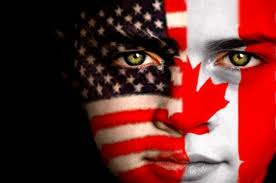 It often feels as though I live my life between worlds. I am a dual citizen of Canada and the United States. My mother is French Canadian, my father Italian Canadian. My wife is Australian and my son is Ethiopian. The questions of identity, culture and nationality seem to be increasingly complex in our increasingly small world. This weekend, both nations that shape my nationalities, celebrate their national identity.
It often feels as though I live my life between worlds. I am a dual citizen of Canada and the United States. My mother is French Canadian, my father Italian Canadian. My wife is Australian and my son is Ethiopian. The questions of identity, culture and nationality seem to be increasingly complex in our increasingly small world. This weekend, both nations that shape my nationalities, celebrate their national identity.
They are days of fun, family and (depending on which side of the border you are on) patriotism- Canadians and Americans both carry a great deal of national pride, even if they do express themselves quite differently. There are days where I increasingly find myself reflecting on what it means to be Canadian/American.
As I move beyond stereotypes, one theme keeps emerging: the critical difference between patriotism and nationalism. For the sake of this post, let me start by defining my terms:
Patriotism: an aspect of worldview that embraces and celebrates positive attitudes towards ones nation, its cultures, its members, its interests, etc.
Nationalism: an over-arching value of national/cultural superiority that defines and/or informs the rest of ones worldview.
While these definitions might be clear in writing, they rarely express themselves so clearly in reality. American history offers some excellent examples of this dynamic, as far back as the American Revolution. Historically, finding nationalism wrapped up in shallow religious clothing is a common trend to manipulate people towards specific political ends. Left too long unchallenged, it lays the seeds for religious fundamentalism as well. In the founding of the United States, the leaders of the Revolution (George Washington, John Adams, Samuel Adams, Thomas Jefferson, etc.) were rationalists, deeply informed by the writings of John Locke, men who conceived of the events in secular terms, whose religious view of the world were deist. And yet, the vast majority of the colonists of that time were deeply Christian in their view, largely Calvinist- at complete odds with their elitist political leaders. How then could such a population be effectively mobilized by under the flag of such opposite ideologies?
As conflict with Britain escalated, political and religious leaders developed a common language to articulate their shared angst. Soon, the political vision for a new nation was being preached in churches as Jesus’s kingdom being established at last. The King was painted as the great enemy, even the Antichrist. Without the imagery, the language and the emotion behind this distinct Christian eschatology, it is doubtful that people would have been as quick (or as militant) in their break with the “motherland”. Even later, with independence won and political leaders dropping their lip service commitment to religion, the seeds had been planted. The new American independence continued to be sacralized, shaping the development of American Christianity forever.
This in no way diminishes or dismisses the genuine faith of my fellow American Christians. However, it does require that we reflect on how our national identities shape the way we see and respond to the world around us, even when we are not consciously aware of how and why we do so. The fact is, the founding of America was the establishment of one of the first truly modern states (built on modernist, Enlightenment ideologies and documents, such as Declaration of Independence), therefore, with these being intrinsic in its religious development, there is often an uncritical embrace of modernity within the church. Consequently, we are more likely to read Scripture and shared the Gospel through the lens of those presuppositions.
While Canada’s more post-Christendom context spares us from some of these dynamics, we deal with our own challenges. Canadians all too often define ourselves by what we are not- namely, that we are not American. This was powerfully illustrated in the single most successful commercial in Canadian history- the “I AM CANADIAN” Molson Canadian beer ad ( http://www.youtube.com/watch?v=BRI-A3vakVg ). While we all laugh at “The Rant”, it also stirs within many Canadians a sense of powerful identity, despite the fact that almost every line is explicitly a point of contrast to our neighbors to the north. In turn, this “anti-identity” shapes the way many Canadian Christians engage in faith- by what we are not (i.e. not the Religious Right; not Evangelical).
Whether Canadian, American, African, European or otherwise, the point is that we must never buy into the lie that our national contexts and cultures do not have explicit and implicit (that is obvious and subtle) impacts on our worldview and more importantly our faith expressions. It is not wrong to love where we come from. The solution to nationalism is not to be ashamed of our nationality. Rather, we must be aware and critical of what makes us who we are and place our primary identity as citizens of the Commonwealth of Christ, the Kingdom of God.
—-
Jamie Arpin-Ricci. CJ, is a writer, 3rd order Franciscan and pastor of Little Flowers Community (www.littleflowers.ca) an inner city church plant in Winnipeg, MB. He is the author of the forthcoming “The Cost of Community: Jesus, St. Francis & Life in the Kingdom” (IVPress, Nov 2011). He blogs regularly at www.missional.ca .
